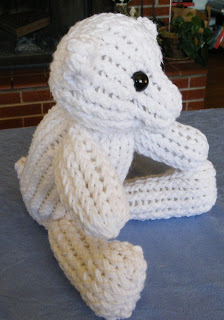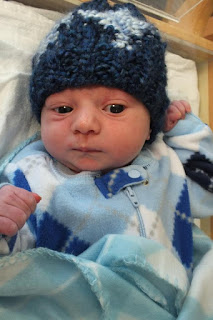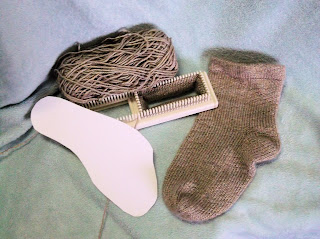Finding the loom you think you will need, with the right
gauge, then what yarn you think will work, with the loom you need, then do you
need to swatch, and all the measuring, and math, and mind boggling things that
circle round and round in your head. What if there was a method that categorized these
things, put them into little boxes you, so you could easily run pick up, and start
working on a project without all the fuss. Is it 100% full proof, by no means,
but if it works 90% of the time, wouldn't you want to know.
This isn't proven science, this isn't a highly experienced
expert pro, on all special what exactly to do, telling you these tricks, it is
just little me who has a system that seems to work 90% of the time willing to
share my tricks with you.
Start Choosing a Loom
Most of us have started off with the Knifty Knitter looms
when we began, well guess what, this is going to be your base for round looms
in the CinDwood world.
The blue 24 peg KK loom did slippers, mittens, and fingerless gloves that fit kinda loose when EW and seemed to work for small stuff like that.
KK looms though were best used, if you doubled the strands on
worsted yarn, or used a single strand of bulky yarn. Keep this in mind.
Stitching between these looms I figured out something, if
you flat knit you got basically half the size of whatever you were making.
Which is probably the reason I don't tend to U knit or Traditional Knit in my
work there can be iffy ranges depending on the hand using the these 2 stitches.
Well if you add in purls to your EW above you got the garment a little smaller
than if it was just EW. Keep this in mind.
Now lets move on to CinDwood looms with 1/2" gauge, these
veer away from the gauging on the KK looms. You ask yourself is it really that
different. Yes and no.
My experience is you can take the say 44 peg 1/2" gauge
and the 36 peg KK loom and use the same kind of yarn and get a product that is
a little smaller with the 1/2", but no huge gaps between your columns of stitching. To me,
removing the gaps between the columns of stitching is the true advantage of the
1/2" gauge, and puts a more pro look to the garment. That is why I prefer to use it. So my trick to tell you is if
you are using the 14, 30, 36, 44, 60 peg in 1/2" gauge they are compared
to the above KK looms.
Next question yarn? What kind of yarn?
1st you need to set the yarns that are generally available,
into groups. I will give a list of yarns that are similar to each other, and
should knit up similar to each other.
Red Heart Super Saver, Bernat Super Value, Caron 1 Pound is a common one used, it is worsted, stiff, has spring to it which means this will knit up and at sitting be smaller. 2
strands are typically needed, but if you flat knit you can use a single strand
of this stuff to make gloves, socks, and anything with a smaller knit appearance.
But you have to use flat knit, double the rows, and know garment is going to be smaller.
Caron Simply Soft, Red Heart Soft, Lions Brand Heartland
These are similar to each other in feel and motion. They are
worsted yarn and don't have much spring in them, soft, and when knitted can
tend to fit looser, to quite a bit looser. They have a heavier feel to them than the super saver yarn
above. This yarn I would say is great for slouch hats as it has a nice loose
hang to it.
Bernat Blanket Yarn and any other brand that has the same
texture and feel goes into the plush catagory. This is a yarn with no spring
and is soo fluffy that it will definitely knit larger. I would not suggest this
style yarn for hats or gloves, they tend to fit way to loose.
Lions Brand Homespun, Red Heart Snuggle Bunny, and any other brand like it is going to
knit very loose if you EW. If you want this yarn to be an equivalent of say Red
Heart super saver using 2 strands in a pattern Flat Knit and use a single
strand in this style yarn. By flat knitting you will be changing how this yarn
will hang and look when loom knitted. Can be great for hats, scarves, cowls, and
slippers when using a flat knit. The Santa hat was EW and the Ice Jacket was flat knit. If you choose to EW might be best to go to the next loom down for sizing.
Lions Brand Hometown, Bernat Softee Chunky, Red Heart Vivid or Grande
and other that are bulky like these but have spring and usually only need 1
strand to do a standard job with a hat, scarf, or cowl. For me this yarn should
be your base for most of your larger gauges from 1/2" to 5/8". I
personally believe these style yarns do optimum for the larger gauges. From
hats to scarves, stuffed animals to pillows. This yarn even cables well. (the
wool blends that are similar to these yarns work well too.)
Above are any of these combos that I would suggest using for
the round looms that are 1/2" to 5/8" gauge. If you find a yarn that
you aren't sure about take these categories of yarns and see which one it lines
best up with and go from there. You are looking for feel, spring, thickness, and
how it weighs. This is a baseline.
Swatching? No.... do I have to?
Not really if you keep these pointers in mind.
Cables shrink the size a little bit for a garment, this was done with Red Heart Grande and it fits smaller to even having been done on the 60 peg 1/2" CinDwood loom.
Using Purls can shrink the size a very very small bit depending on the amount of purling you use.
Using a Rib stitch can allow for more stretch and sizing
options (great for a fitted cuff area of glove and slippers) So if you had straight up just knitted these items with no ribbing they wouldn't fit like this below. The would fit loose and baggy.
Using a Seed stitch will allow for no spring at all and will
fit larger (this means if you are using a stitch pattern with an equal amount
of purls and knits overlapping or falling on top of each other the garment will
fit larger. See how the bottom ridge is spread out.
Flat Knit is half the size of EW plus you will need to
almost double the rows in comparison to EW if you are after a garment the same size. Below is a bear done in EW and a bear done in flat knit on the same loom.
If you are doing any kind of lace stitch this will make the
garment larger. For instance this hat is categorized as adult but was done on the 36 peg KK loom. Simply soft yarn and lace stitching made it much larger to the point I needed to go down a size loom.
If you aren't sure about the stitch pattern, then swatch by
only do a single set of the stitches and rows that make up the stitch pattern
to see how it will move and hang with the yarn you are using.
Other points that will make doing patterns easier
Lets say you are working from a pattern, ask yourself these
questions.
What loom comes to the closest equivalent to the one used if
you don't have that loom?
Look above in the categories I have listed.
What yarn did they use and what other yarns are very similar
to that yarn?
Also look above for equivalents.
Is there a heavy stitch pattern going how will it effect the
yarn when knitted with it?
Look to the pointers above.
What about all the other looms that are available with CinDwood Looms?
The new fine gauge series is very similar to KB looms but has ring sizing similar to the KK looms.
Some KB patterns will work on a fine gauge CinDwood loom?
Yes they can, I based my fine gauge book off of a sock pattern I did on the KB sock loom, and adjusted it to the CinDwood looms. I also used a similar concept, I did for the gloves, I did on the wider gauge to fit the fine gauge.
Keep in mind the width of the looms and how they are similar to the KK looms above. Depending on how the width of the looms are, depends on what you will use them for. Sizing still applies when deciding on hat sizing, gloves, socks, scarves, cowls, and other items. Look above. For instance the 56 peg 1/4" gauge and 40 peg 3/8" gauge is on a ring that is the same size as the 24 peg KK. This means it will work for socks and gloves. While the 80 peg 3/8" gauge and 120 peg 1/4" fine gauge loom as a same ring size of the 41 peg KK loom. Which means adult hats and cowls. Fine gauge you will need to do more knitting and not so much EW. I would only suggest EW if you are cabling.
Is the stitching and yarn different for these looms?
Is the stitching and yarn different for these looms?
Yes, for instance while figuring out the fine gauge sizing before they were released, thinner yarns needed to be used. These are examples of size 2 to 3 yarns done on the fine gauge CinDwood looms.
The Cascade yarn was used for the knitted knockers in DK and Ultra Fine.
The Cascade yarn was used for the knitted knockers in DK and Ultra Fine.
What might surprise you is that the Red Heart Boutique Unforgettable may be worsted, but on average that stuff works thinner, and does great for gloves and socks on a fine gauge loom. Look for other yarns like it.
Yarns that are size 4, 3, and even 2 work on the fine gauge looms. Keep in mind the fatter the yarn the larger the finished product will be. Sizing will vary but should vary vastly, mostly slightly. Keep in mind your rows will be less or more too depending on the yarn, simply use a measuring tape to measure if you length is right.
Yarns that are size 4, 3, and even 2 work on the fine gauge looms. Keep in mind the fatter the yarn the larger the finished product will be. Sizing will vary but should vary vastly, mostly slightly. Keep in mind your rows will be less or more too depending on the yarn, simply use a measuring tape to measure if you length is right.
As for the long looms and S looms well that is another story.
I don't have as many suggestions for these as I have not worked with these types of looms much at all. I have worked with the smaller S loom 36" to make the sweater poncho. I did it on a first go. How the heck did you do that? Well I took some basic information and went with it. CinDwood's website will tell you what those S looms will make in blanket size using the EW. I saw what size and took a look at a blank or sheet I had around the house in that size, and asked myself what would I need to do to make it the size I want. Well I knew I needed 2 halves that were that of a twin to make a poncho. Then I measured myself on how long I needed to make a half. I worked 10 rows to see what that was getting me in inches and did the math of how many rows I needed to make my measurement. Then did some math on how often I needed to decrease until I got to a certain point. After that I just measured till I got the measurement I needed, and then worked my way from there to make a turtle neck, that I knew the 60 peg loom 1/2" gauge would work, and knew I needed to do a large decrease and move the stitches to that loom. Low and behold it worked. Sometimes the basic info is there to give you all the info you need to get started.
So as a finishing note for you to keep in mind. Find a loom you have worked with a lot, if you are trying a new loom, find what other loom comes the closest to it. Take the knowledge you know from that loom that is closest to the new one, and work from that knowledge. Remember, sometimes it is good to take a step back, and see if you can get the info down to basic grouping, and save yourself the mind boggling circles.
Good Luck and Happy Looming!!!
















































comfortable and stylish at the same time. The featured products of Yhao brand include Yhao yoga socks, Yhao sports socks, Yhao beanie hats and Yhao knit touchscreen gloves. personalized fingerless gloves
ReplyDeleteWhat does EW stand for?
ReplyDeleteThey are also generally easier and take less time than many of the larger knitted products. sportsragg billigt
ReplyDelete